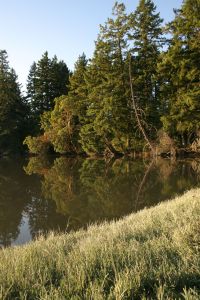Our Water, Our World: Scarcity and SustainabilityPaul Pickett
Jared Diamond, in his book Collapse, tells a cautionary tale of societies that We are running out of time. "We're running out of water!" I hear that phrase a lot, as well as the terms "scarcity" and "shortage," used by both the environmental community and developers. It's a curious way to frame the problem. Think about it: though there are periods of drought in specific areas, water still falls from the sky. In fact, some climate change scienists suggest that our region may actually see more rain on average in the future. What makes a shortage is not a lack of water but over use of this essential resource. If we turned on every light and appliance in the house, and the fuse blew, would we say, "We ran out of electricity?" It seems like a common human problem, that when we start using up our resources we want more. But to understand the problem correctly, we have to see that it has a supply-side, and a demand-side.. People seem to only talk about supply-side solutions, especially people making money off the supply This mindset is widespread with water resources issues. I Politicians and consultants talk about growth and ask, "Where will we get more water?" The conventional answers are; drill more wells, build more dams, or put bigger pumps in the river. But as you, dear reader, surely know, the more water people use, the less there is available for the environment. I obtained my academic degrees in California, where I learned a lot about water issues. Irrigation diversions have dried up major salmon rivers like the San Joaquin. Demand from the cities drives political initiatives for more canals and bigger. When visiting my brother in Southern California, I asked him, "Do people here ever discuss the concept that there may not be any more water?" He responded, "It never crosses their minds." After 20 years in Washington, I believe we are about ten years behind California. Because of population growth and development, municipal policy makers and their consultants are always looking for new supplies of water. In fact, the solution is not on the supply side, but on the demand side. The same mindset exists for petroleum. When high demand in the U.S. combines with increasing demand from India and China, gasoline prices soar. Politicians are calling for more drilling in the Artic and off our coast. What they aren't doing is educating the public that there is no supply-side solution. Many believe we've passed "peak oil" and that supplies will grow less productive and more expensive to develop. On top of that, increased supply to feed unquenchable demand add to our climate change problems. Supply-side answers no longer serve; it's time for demand-side solutions. So how do we reframe the issue? Whenever someone says, "We're running out of water," the answer must be, "No, we're wasting what we have; there's plenty if we use what we have more efficiently." For example, the City of Seattle has kept its water supply use at the same level for over twenty years and provided water for all its growth through conservation. It's the same story with oil supplies: many European nations sustain a higher standard of living than the U.S., with far less energy consumption. We don't need more supplies of oil and water, we need to stop wasting what we have and use energy more efficiently. Paul Pickett is an environmental engineer, Public Utility District Commissioner, and occasional columnist for Green Pages.
Back to Home page. |

 overexploited their resource base and fell into decline. The challenge is not just to protect our environment, but also to protect humanity and our quality of life.
overexploited their resource base and fell into decline. The challenge is not just to protect our environment, but also to protect humanity and our quality of life.